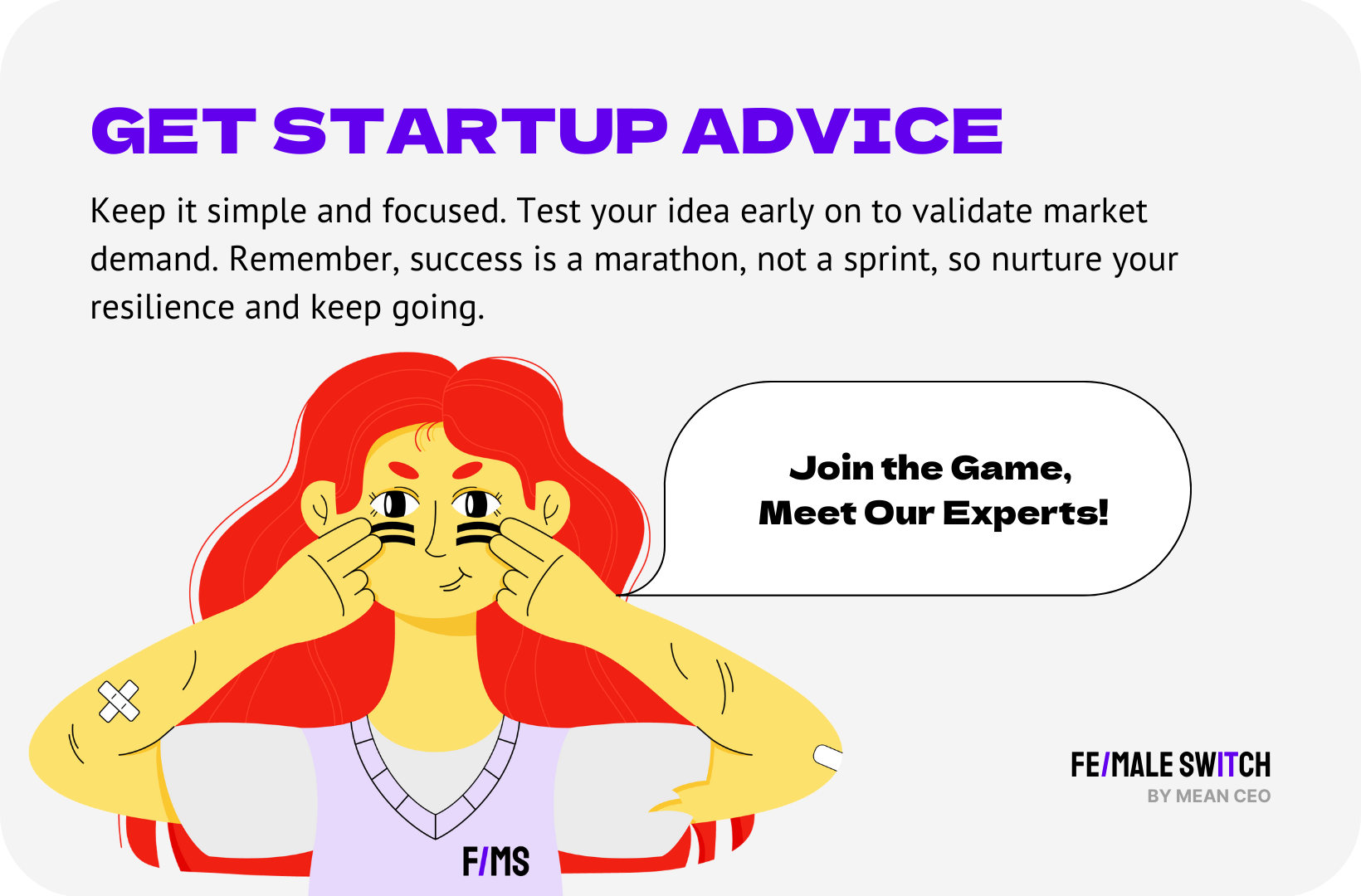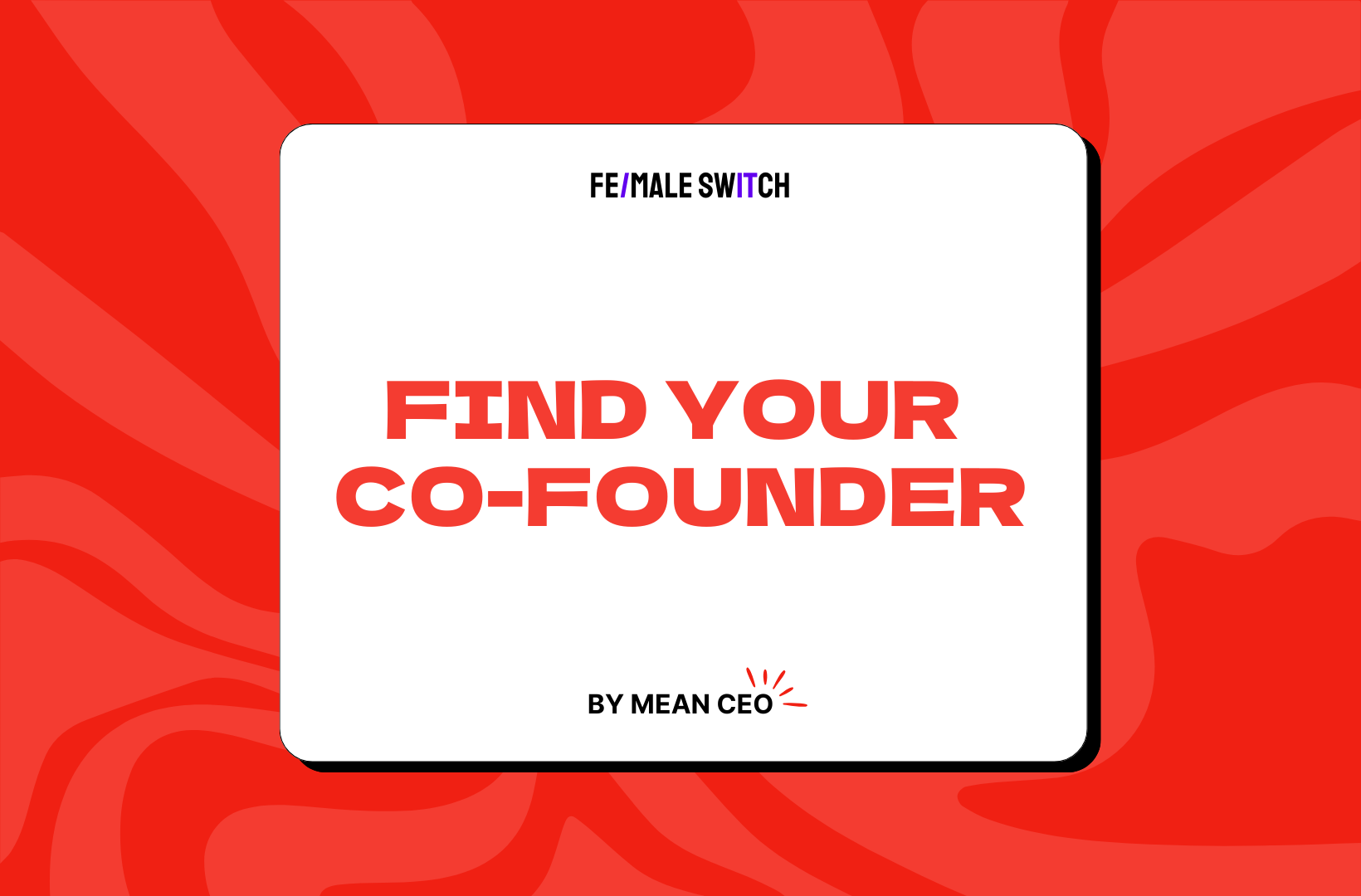TL;DR
Embarking on the exhilarating, yet daunting task of finding a co-founder? Here's the scoop: successful startups often have the trio - a visionary, a hacker, and a hustler. At Fe/male Switch, founded by the knowledgeable and vivacious Mean CEO, we've distilled this essence into our startup game, assisting you in building a stellar core team. With our free-to-start program, you can harness the collective power of diverse talents like our AI co-founder, Elona Musk, and our seasoned tech experts.
When scouting for your startup's co-founder, think compatibility and complementary skills. Need a blueprint? Our game equips you with a co-founder agreement template and stories of successful partnerships such as Intel and Google. Remember, securing a co-founder is just the prelude; investors crave balanced co-founder teams. So dive into the Fe/male Switch universe, strategize with Mean CEO, and sail past that coveted $100k revenue mark with your business soul mate by your side.
Introduction
Let's talk straight – scouting for the right co-founder for your startup is like finding a needle in a haystack, but hey, consider me your entrepreneurial magnet. As MeanCEO, aka Violetta Bonenkamp, with my bag of tips and tales, we're going to make this match-making process less about luck and more about strategy. Picture the worst blind date ever – yep, that's what it's like to tie your startup dreams to the wrong co-founder. Not only awkward but potentially business-ending. Ready to get anxious? The right co-founder can skyrocket your startup to stardom, while the wrong one can drag it down into the abyss of failed ventures. Let's dodge that bullet together.
Now, exhale, we're not just going to agitate those nerves without offering a lifeline. I've seen my fair share of startups in Europe kissing the ground before taking off because they picked someone who can't tell the difference between Bitcoin and a Chuck E. Cheese token. So, I've got some hard-earned wisdom to share – think of it as your co-founder cupid’s arrow. We'll slice through the fluff, tackle the essentials, and I'll even throw in some numbers to keep us grounded. Because let’s face it, a startup without the right co-founder is like a high-tech rocket with duct-tape patching its wings - not a pretty sight, right? Let's gear up and secure the co-founder who will not just share the ride, but also fuel it. Buckle up; it's going to be one hell of a ride, and I'm your co-pilot.
Establishing the Core Team for Your Startup
Defining Co-founder Roles and Responsibilities
Tackling the nuts and bolts of startup roles, understanding the differences between founder and co-founder is like splitting an atom—you've gotta be precise to avoid disaster. Your founder conjures the big bang, the eureka moment that births the idea. A co-founder, on the other hand, rides shotgun, steering the idea through the rollercoaster that is startup life. Identifying the essential roles in a startup isn't rocket science—it's common sense mixed with a dash of Kung Fu balance. You need the yin of business savvy with the yang of technical know-how to nail that perfect equilibrium for leadership. Now, here's the real MVP of startup prep—a cofounder agreement template startup. It's more than a pinky promise; it's your blueprint for business harmony. Imagine the peace of mind, knowing roles, equity, and what-ifs are ironclad on paper.
- Founder ignites the idea; co-founder fuels it into fruition.
- Strike the right balance with tech smarts and business brains.
- Co-founder agreement template: Your ticket to startup sustainability.
The Visionary, the Hacker, and the Hustler: A Trio for Success
Behold, the startup trinity—the visionary's role is to christen the ship, charting the course through stormy markets with a star-studded gaze. Next, enter the hacker, the coding ninja who can transform your midnight ramblings into a sleek, functioning product. This key player turns caffeine and pizza into secure, scalable software. Then, we've got the hustler, the smooth-talker whose networking prowess wins wallets and hearts alike, catapulting sales and growth like you wouldn't believe.
- Visionary pitches the dreams; hacker lays the digital bricks.
- Hustler spreads the gospel, securing deals and digits.
- The perfect trifecta for any startup success saga.
Successful Co-Founding Team Stories
Now, who doesn't love a good success story? Airbnb’s renting revolution? It's like creating a comfy castle from an air mattress—genius! Intel’s dynamic duo of Moore and Noyce? They turned silicon dreams into a tech empire. And Google's Page and Brin? Started as scholarly sparring partners and ended as kings of cyberspace. Researching these titans isn't just for kicks; it's startup schooling. Digest their strategies and synergies because what worked for them could very well be your golden ticket too.
- Airbnb, Intel, Google: from garages to greatness.
- Innovation marriages that made tech history.
- Lessons from the legends—a startup masterclass.
Did you know, for example, that the founders of Airbnb met through a Craigslist ad? Talk about a modern-day fairy tale twist! By diving into details and analyzing what made these teams successful, you can borrow a page from their playbook and maybe even write your own Cinderella story. But remember, although it's crucial to learn from these icons, your startup’s narrative will have its unique chapters. Embrace them, and who knows? Maybe your story will join the hall of fame in the not-so-distant future.

5 Tips to Secure the Right Co-Founder for Your Startup Love Affair
1. Define Your Non-negotiables
Lights, camera, action! Start by jotting down what's absolutely vital in a co-founder. You want to make sure your co-founder is more of a hero than a sidekick in your entrepreneurial plot.
2. Draft the Ultimate Co-founder Wanted Poster
You're not just looking for a partner in crime; you're casting for a blockbuster hit. Be clear and creative when defining the role. Think LinkedIn on steroids – you want your ad to capture the essence of your startup vision.
3. Speed Date Your Way Through Your Network
Engage at full throttle with your network. It's business matchmaking: explore events, forums, and LinkedIn groups with the passion of a teenager at a pop concert.
4. Swipe Right on Compatibility and Skills
Seek a balanced relationship with a co-founder who complements your skills. Imagine you're creating a superhero duo, where your powers combined can save the world (or at least disrupt a market).
5. The Deal Sealer: A Rock-solid Co-founder Agreement
Think of your co-founder agreement as the relationship prenup. It's vital. Outline everything from equity to exit strategy - no hazy lines here. You want your partnership to last longer than a Hollywood marriage.
Navigating the Search for a Startup Co-founder
How to Find a Co-founder for Startup Success
In the startup odyssey, finding the right kind of righthand person can make or break your epic. It ain't just about finding another warm body to fill a seat; it’s about finding the yin to your yang. Start by activating your Sherlock Holmes mode and leveraging your network and industry connections. The goldmine could hiding in plain sight – think LinkedIn, alumni networks, industry meet-ups – all teeming with potential co-founder material.
But don't just stop there! For those feeling a bit more digitally savvy, online platforms and specialty networks are like the speed-dating scene of the startup ecosystem – places like CoFoundersLab or FoundersNation where you can swipe right on business talent. And don’t forget about the real-world charm of startup communities and events like TechCrunch Disrupt or your local hackathons. It's like a buffet banquet of intellect and ambition – just waiting for you to say, "You had me at startup."
Think about this – dipping your toe into the zero-code movement with powerhouses like Make, Bubble, and Adalo can not just save you from emptying your pockets on developers, but also give you a swanky MVP to show off at these networking shindigs. It's like wearing a Cinderella dress to the ball, but without the midnight deadline.
Evaluating Potential Co-founders for Compatibility and Skill
Once you've lured potential co-founders into your web with your startup siren song, it's time to get real. Bring out the big guns with candid discussions about goals, motivations, and work ethics. It's like first-date conversation but for business: What gets you out of bed in the morning? Besides, of course, the seductive scent of fresh coffee and the promise of crushing the entrepreneurial game.
Assessing the balance of technical skills and business acumen is like putting together a championship sports team – you need players who can shoot the hoop and guard the net with equal prowess. And don't you dare skip the chemistry test; personality tests and other tools for deeper insight are your truth serum – they peek into the soul and reveal whether your potential co-founder can dance to the rhythm of your startup beat.
Securing Commitment: Crafting a Co-founder Agreement
Ah, the co-founder agreement. This isn't just some pinky promise sealed with a locker combo. A bona fide co-founder agreement template startup transforms the "what-ifs" from niggling doubts into black-and-white clarity. We're talking equity, roles, responsibilities, and exit strategies – basically everything but your favorite pizza toppings (though, let's be honest, that’s important too).
This piece of parchment – or, for our modern warriors, that digital doc – is the Excalibur in your startup armor. Make it robust; protect thyselves from future battles of wills and woes with legally binding wizardry. Think of the co-founder agreement as your trusty sidekick, keeping the peace and order while you plan corporate conquests and world domination (in the nicest possible way, of course).
And trust me, drawing these lines in the entrepreneurial sand doesn’t just prevent future headaches, it's also like waving a giant flag to investors saying, “Look! We've got our act together.” Ain’t nobody got time for co-founder squabbles when there are empires to build and dragons to slay (metaphorically speaking... unless your startup is into that).

Building and Sustaining Startup Momentum
Benefits of Having a Co-founder in Business
When we talk about the benefits of having a co-founder in business, I'm reminded of those buddy cop movies where each lead brings a different skillset to the table (but, you know, without the crazy car chases). There's a duality here that goes beyond shared risk; it's about enriched problem-solving. Like, when you're staring down the barrel of a code-red business issue, two heads are better than one – especially when they wear different thinking caps.
Having a co-founder can mean doubling down on innovation. You've got someone to volley your wild ideas with until you've got that 'aha!' solution that could only spark from combined creativity. Co-founder roles and responsibilities can diverge, making for a powerful concoction of technical prowess and marketing flair. Imagine Jobs without Wozniak or vice versa; the Apple might have never ripened.
In the labyrinthine world of entrepreneurship, facing challenges alone can feel like juggling chainsaws on a tightrope. With a partner in crime (the non-criminal kind, obviously), you're backed by a supportive dynamic that cushions the blow of setbacks. This support system isn't just fluffy feel-good; it's a strategic buffer against the all-too-common startup burnout.
Integrating Modern Tools for Startup Efficiency
Now, let’s talk about integrating modern tools for startup efficiency. I mean, why swing a pickaxe in your digital goldmine when you could be using dynamite? For instance, zero-code platforms such as Bubble and Adalo allow you to create apps without writing a single line of code. That's not only budget-friendly; it’s a godsend if you didn’t nab a techie co-founder—Do It Yourself: why you DON'T need a technical co-founder digs into this very idea.
Then you've got AI. Let's say you're not a data scientist; no sweat! AI tools can analyze trends, automate customer service, and even personalise marketing campaigns at a click. It’s not just about jumping on the tech bandwagon; it's about strategically harnessing these game-changers for that competitive edge that makes investors sit up and pay attention.
For the icing on this efficiency cake, think workflow automation. Gone are the days of pounding coffee at 3 AM trying to sync your tasks – now, you can orchestrate your entire startup's symphony from one dashboard. Tools like Make can tie your digital operations together so smoothly, you'd swear there's startup pixie dust in the code.
Attracting Investors with a Strong Co-founding Team
Let's slice into the investor appeal pie with a sharp co-founding team as our knife. Investors are like matchmakers; they're not just looking for a dazzling founder, they want a love story that promises a happily ever after. They peek under the hood at the co-founder dynamics, weighing your team's balance of hard tech skills and soft interpersonal ones like it’s a fine wine.
Now, don't just tell investors about your rockstar team; show 'em! Showcase that you've got the masterminds to transform vision into reality like a well-oiled machine. Have stories at the ready—like how you deftly pivoted during a crisis, or how you turned feedback into gold. Real stuff, real impact! For some storytelling inspo straight from the pros, nonchalantly drop "Startups in Europe: Innovative Potential of European Economies" into your next coffee convo.
And if you think crafting a startup narrative is just for bedtime, think again. Investors adore a good tale complete with heroic feats (read: milestones) and a dazzling track record. It’s your chance to prepare a compelling narrative that's not about fluff; it's about staking your claim in the land of startup giants. Remember, investors are betting on your movie being a blockbuster hit, so sell them that Oscar-worthy script, and don’t skimp on the special effects—the real, hands-dirty, hard-work type.

Conclusion
Listen up, trailblazers and co-founder seekers—getting this co-founder thing right is not just a nice-to-have, it's your ticket to Startuptopia. Think of your co-founder as the yin to your entrepreneurial yang. You need someone who is as different from you as mac is to cheese, yet combined, you create startup magic. Can you go it solo and rake in $100K? Sure, maybe. But add a sprinkle of complementary skills, a dash of shared grit, and you're looking at a recipe that could rocket your revenue to the stars. Always remember, like an investor with a magnifying glass, zoom in on the mix of hard-tech wizardry and soft-skill wizardry when eyeing a potential co-founder. And let's not forget, your future business partner might be hiding in plain sight, at a dog park or lurking behind a Craigslist ad. At the end of the startup race, it's the co-founder chemistry that can fuel your rocket ship or ground it before takeoff. So keep those network antennas up and buzzing, and you just might find your startup soulmate. 🚀❤️
FAQ
What are the qualities of a good co-founder in a tech startup?
Budding entrepreneurs, listen up! A crackerjack co-founder in the tech universe should be the yin to your yang, meshing with your modus operandi like puzzle pieces with finesse. You’ll want them armed with trustworthiness sharper than a freshly-honed blade, commitment thicker than your thickest milkshake, and communication skills that would give TED talkers a run for their money. In the startup realm where days spin faster than a fidget spinner, aligning with someone who shares your work ethic and baths in the same passionate entrepreneurial whirlpool is not just precious, it's non-negotiable. So, aspiring startup moguls, for a deep dive into the co-founder cosmos, take a jaunt through this insightful piece over at Quora.
What are common characteristics of founders of successful startups?
For those itching to climb the startup ladder, here's the skinny: innovation isn't just a buzzword, it's the DNA of any triumphant founder. Top dogs in the startup kennel fetch attributes like innovation and self-awareness as effortlessly as a golden retriever fetches a tennis ball. They boast a vision as clear as HD, stoke the fires of passion, and bounce back like champs with resilience that'd make a Weeble wobble with respect. They plot for the future with an accuracy rivaling a Nostradamus prophecy, communicate with a silver tongue, and make decisions with the speed of a gunslinger. Still curious? Fetch more insights from The Startup Weekly.
What is the role of a tech co-founder?
A tech co-founder is pretty much the Wizard of Oz behind the digital curtain, turning gears and pulling levers to morph the product from a sketch on a napkin to the next big tech splash. This tech guru not only tosses in a hefty spoonful of expertise but stirs the pot alongside the rest of the team, ensuring the brew boils down to success – the golden liquid we're all after. From blueprints to bytes, they connect the dots with their techie magic wand. Think you might be needing one? Pull back the curtain and read more at FasterCapital.
What is the role of a co-founder in a startup?
Co-founders do more than just sip cold brews and toss around buzzwords; they're rockstars of the startup stage. From the heavy lift of product development to the wooing dance of sales and marketing, they're at the helm. They're the operational puppeteers and the financial fortunetellers, all in one. But here’s the kicker: it's vital they understand who in the band calls the shots and how the rhythm of decision-making beats. It's this symphony of roles and responsibilities that drives startups from garage gigs to headline acts at the entrepreneur festival. Rock out with more riffs on this at AIContentfy.
Are there certain traits that distinguish a successful tech startup co-founder?
Tech startup co-founders are a unique breed—they're the visionaries and the doers, the dreamers and the pragmatists. They possess a hybrid vigor of technological savvy and business acumen. They are the architects of innovation, the bedrock of resilience, and the ringleaders who can turn a code into gold. It's their ability to see into the tech future and chart a course that skirts the whirlpools of the industry. For every Zuckerberg and Musk, there's an unseen mind map and a dogged determination to make the impossible possible. Want the inside scoop on what makes them tick? Scope out this LinkedIn article.
Can personality traits predict startup success?
In the startup casino, personality traits are the high cards. Successful startup whisperers tend to checkmate with traits like openness and conscientiousness, rock'n'roll with extraversion, and charm the pants off with agreeableness, all while keeping pace like a metronome. It's the founders' personalities that hoist the sails and set the course in the uncharted waters of business. Every captain of industry knows, it's one part skill, and two parts swagger that chalk up the win. Dive into this study in Nature for a scientific look at founder personalities and startup success.
How important are co-founders' complementary skills in a startup's early days?
In startup land, complementary skills between co-founders are like peanut butter and jelly in a sandwich—the perfect combo. It's all about bringing diverse superpowers to the table. If you're a code slinger, team up with a financial samurai or a marketing maven. It’s in these hallowed combos that startups go from concept to IPO-scrolling stardom. It's not just a strength multiplier, but a resilience booster pack for when the going gets as tough as old shoe leather. Get the deets on the importance of skill diversity from the brainy bunch at Emeritus.
Do co-founders need to have tech skills in a tech startup?
In the script of any tech startup, at least one co-founder rocking tech skills is as essential as caffeine in the coder's bloodstream. They're the ones turning binary bits into memorable pixels, crafting the tech wizardry behind the app or service. Now, if you've got more charisma than C++, fret not. It's fine to play to other strengths, but make sure your co-founding comrade can sling code with the best of them. For tales from the tech trenches and why this dynamic duo matters, plug into Altar.io for a coder's view.
What common challenges do co-founders face in a tech startup?
Co-founders in the tech rush face everything from idea inception in the witching hours to snagging that sweet, sweet venture capital. They'll grapple with product pivots, groan under growth pains, and dance with data disasters. It's a high-stakes game where communication snafus and responsibility roulette can make or break the dream. But with every challenge comes a shot at glory, so strap in and arm yourself with intel. To slay the dragon of startup adversity, check out the sword-and-shield advice at Startups.com.
How do co-founders balance control and collaboration in a tech startup?
Co-founders waltzing through the tech startup tango need to both lead and follow. It's about striking the balance between gripping the reins and trusting your partner to steer the chariot part of the way. Control and collaboration are the twin engines, and you want them perfectly in sync. It's like making a bitter espresso; you need the perfect grind of individual strengths and a well-brewed mix of teamwork. For more brew methodology and how co-founders can harmonize their moves, sip on the wisdom at Entrepreneur.
Valuable Resources
For those embarking on the entrepreneurial journey or looking to enhance their startup knowledge, here are ten invaluable articles and tools that can serve as a guide and inspiration:
- How to find a Co-Founder for Your Startup and what to ask them - Essential pointers on locating the perfect partner in crime for your business venture.
- Controversial Debate: Is a Technical Co-Founder Really Necessary for Startup Success? - Unpack the debate around the necessity of a technical co-founder and decide if it's right for your startup.
- Why Ignoring Your Physical Health as a Startup Founder is a Recipe for Disaster - Find out why self-care isn't just good for you, it's good for your business too!
- What Is a Startup? - Demystify what it really means to be a startup in today's competitive landscape.
- Validating a product without having the product - Learn smart tactics for testing your business concept before making a big investment.
- Female Entrepreneurship: The Fastest-Growing Sector in Modern Business - Discover why female entrepreneurs are shaking up the startup world and how you can join them.
- Startups: Mentors and Mentees - Gain insights on the mentor-mentee dynamic and how it can supercharge both your personal and startup growth.
- 5 Reasons Why You Need a Mentor - Uncover the compelling reasons why a mentor is a game-changer for you and your startup.
- Trade secret identifier tool - Find out if your unique idea qualifies as a trade secret to secure a competitive edge.
- Landing page analysis tool - Enhance your startup's first impression with AI-driven feedback on your landing page.


